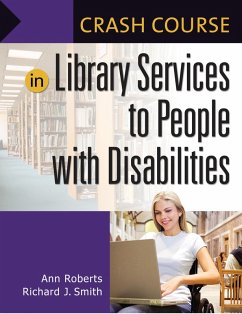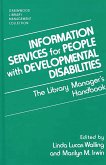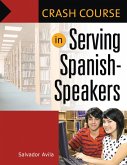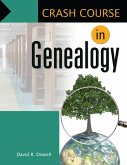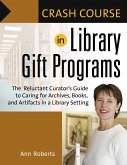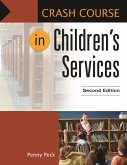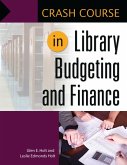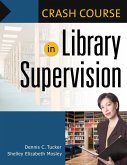Ann Roberts, Richard J. Smith
Crash Course in Library Services to People with Disabilities (eBook, PDF)
33,95 €
33,95 €
inkl. MwSt.
Sofort per Download lieferbar

17 °P sammeln
33,95 €
Als Download kaufen

33,95 €
inkl. MwSt.
Sofort per Download lieferbar

17 °P sammeln
Jetzt verschenken
Alle Infos zum eBook verschenken
33,95 €
inkl. MwSt.
Sofort per Download lieferbar
Alle Infos zum eBook verschenken

17 °P sammeln
Ann Roberts, Richard J. Smith
Crash Course in Library Services to People with Disabilities (eBook, PDF)
- Format: PDF
- Merkliste
- Auf die Merkliste
- Bewerten Bewerten
- Teilen
- Produkt teilen
- Produkterinnerung
- Produkterinnerung

Bitte loggen Sie sich zunächst in Ihr Kundenkonto ein oder registrieren Sie sich bei
bücher.de, um das eBook-Abo tolino select nutzen zu können.
Hier können Sie sich einloggen
Hier können Sie sich einloggen
Sie sind bereits eingeloggt. Klicken Sie auf 2. tolino select Abo, um fortzufahren.

Bitte loggen Sie sich zunächst in Ihr Kundenkonto ein oder registrieren Sie sich bei bücher.de, um das eBook-Abo tolino select nutzen zu können.
This book helps libraries identify and implement new ways to serve their physically or mentally disabled patients.
Authors Ann Roberts and Dr. Richard Smith work at the state level with persons with disabilities. They find that very few librarians feel comfortable with providing services addressed to the needs of the disabled, yet those who do offer services and programs other libraries can adopt and adapt.
Crash Course in Library Services to People with Disabilities will help librarians get up to speed in understanding disabled persons and what they can do to make library premises…mehr
- Geräte: PC
- mit Kopierschutz
- eBook Hilfe
- Größe: 0.97MB
Andere Kunden interessierten sich auch für
![Information Services for People with Developmental Disabilities (eBook, PDF) Information Services for People with Developmental Disabilities (eBook, PDF)]() Marilyn M. IrwinInformation Services for People with Developmental Disabilities (eBook, PDF)81,95 €
Marilyn M. IrwinInformation Services for People with Developmental Disabilities (eBook, PDF)81,95 €![Crash Course in Serving Spanish-Speakers (eBook, PDF) Crash Course in Serving Spanish-Speakers (eBook, PDF)]() Salvador AvilaCrash Course in Serving Spanish-Speakers (eBook, PDF)33,95 €
Salvador AvilaCrash Course in Serving Spanish-Speakers (eBook, PDF)33,95 €![Crash Course in Genealogy (eBook, PDF) Crash Course in Genealogy (eBook, PDF)]() David R. Dowell Ph. D.Crash Course in Genealogy (eBook, PDF)33,95 €
David R. Dowell Ph. D.Crash Course in Genealogy (eBook, PDF)33,95 €![Crash Course in Library Gift Programs (eBook, PDF) Crash Course in Library Gift Programs (eBook, PDF)]() Ann RobertsCrash Course in Library Gift Programs (eBook, PDF)33,95 €
Ann RobertsCrash Course in Library Gift Programs (eBook, PDF)33,95 €![Crash Course in Children's Services (eBook, PDF) Crash Course in Children's Services (eBook, PDF)]() Penny PeckCrash Course in Children's Services (eBook, PDF)33,95 €
Penny PeckCrash Course in Children's Services (eBook, PDF)33,95 €![Crash Course in Library Budgeting and Finance (eBook, PDF) Crash Course in Library Budgeting and Finance (eBook, PDF)]() Leslie Edmonds HoltCrash Course in Library Budgeting and Finance (eBook, PDF)33,95 €
Leslie Edmonds HoltCrash Course in Library Budgeting and Finance (eBook, PDF)33,95 €![Crash Course in Library Supervision (eBook, PDF) Crash Course in Library Supervision (eBook, PDF)]() Shelley Elizabeth MosleyCrash Course in Library Supervision (eBook, PDF)33,95 €
Shelley Elizabeth MosleyCrash Course in Library Supervision (eBook, PDF)33,95 €-
-
-
This book helps libraries identify and implement new ways to serve their physically or mentally disabled patients.
Authors Ann Roberts and Dr. Richard Smith work at the state level with persons with disabilities. They find that very few librarians feel comfortable with providing services addressed to the needs of the disabled, yet those who do offer services and programs other libraries can adopt and adapt.
Crash Course in Library Services to People with Disabilities will help librarians get up to speed in understanding disabled persons and what they can do to make library premises and holdings more accessible to them. It provides basic information on the different types of mental and physical disabilities a librarian might encounter, then offers a range of exemplary policies, services, and programs for people with disabilities-efforts that are in place and working across the country.
Authors Ann Roberts and Dr. Richard Smith work at the state level with persons with disabilities. They find that very few librarians feel comfortable with providing services addressed to the needs of the disabled, yet those who do offer services and programs other libraries can adopt and adapt.
Crash Course in Library Services to People with Disabilities will help librarians get up to speed in understanding disabled persons and what they can do to make library premises and holdings more accessible to them. It provides basic information on the different types of mental and physical disabilities a librarian might encounter, then offers a range of exemplary policies, services, and programs for people with disabilities-efforts that are in place and working across the country.
Produktdetails
- Produktdetails
- Verlag: Bloomsbury Publishing Inc
- Seitenzahl: 176
- Altersempfehlung: ab 7 Jahre
- Erscheinungstermin: 23. März 2010
- Englisch
- ISBN-13: 9781610690560
- Artikelnr.: 37959645
- Verlag: Bloomsbury Publishing Inc
- Seitenzahl: 176
- Altersempfehlung: ab 7 Jahre
- Erscheinungstermin: 23. März 2010
- Englisch
- ISBN-13: 9781610690560
- Artikelnr.: 37959645
- Herstellerkennzeichnung Die Herstellerinformationen sind derzeit nicht verfügbar.
Ann Roberts is a reference librarian at the United State Patent and Trademark Office, Public Search Facility. She has worked in public, academic, and government libraries, as well as with historical collections.
Ann Roberts is a Certified Archivist and has worked in historical societies, archives and libraries for almost twenty years. She is currently the Adult Services Consultant for the Missouri State Library and Coordinator of the Missouri Center for the Book.
Ann Roberts is a Certified Archivist and has worked in historical societies, archives and libraries for almost twenty years. She is currently the Adult Services Consultant for the Missouri State Library and Coordinator of the Missouri Center for the Book.
A Note from the Editor Introduction Chapter 1: Taking Stock American
Library Association: Library Services for People with Disabilities Policy
Policy Statements and the Request for Accommodation Americans with
Disabilities Act Compliance Policy Statement of Policy Amesbury Public
Library Requests for Accommodations for Library Programs Reasonable
Accommodation Request Form Where to Begin The DO-IT Center Issues to
Consider Legal Issues Building Access and Environment Library Staff Library
Services Adaptive Technology for Computers Electronic Resources Helpful
Communication Hints Other Accommodations Getting in on the Ground Floor
Disabled or Dislabeled? Conclusion Chapter 2: Leading by Example The
Numbers The Decennial Census Long Form Know Your Resources Marketing Your
Library's Service to Persons with Disabilities Perfect Partners: A Special
Needs Lending Library In-Home Library Services Getting Started with In-Home
Library Service Chelsea District Library The Right Person for the Job
Skills Development Security Issues On the Security Flip Side Protection of
Children, the Elderly, and Individuals with Disabilities Pre-employment or
Volunteer Screening State Laws Programming Art Abilities: Beauty in
Differences Shake Things Up: Gaming for All One-Switch or Retro Games
Wii-Habilitation Other Suggestions Conclusions Chapter 3: Assistive
Technology and Total Access The Alliance for Technology Access
Communications Minimum Requirements for Effective Communication Facility
Accessibility to Library Services and Programs Technology Starting Goals
Web Site Starting Goals Testing for Web Accessibility Introduction to Web
Accessibility A Pragmatic Approach Common Assistive Technologies in
Libraries The Association of Assistive Technology Programs Conclusion
Chapter 4: Library Services to Baby Boomers and Older Adults Transforming
Life after 50 Realities The Physical Changes Guidelines for Library and
Information Services to Older Adults Computer Training for Older Adults
Older Adults and Web 2.0 Senior-Friendly Web Sites Blogs Gaming . Again
Electronic Games Electronic Brain Games We Like to Play . Wii Academic
Libraries and Wii Health Literacy What Is Health Literacy? The NAALS Report
Savvy Senior Health Programming Ideas to Improve Physical and Mental Health
in Seniors Book Discussion Groups Choosing the Books Discussion Preparation
Personal Memoir Writing Memory Lane The NLS and Library Services to the
Blind and Physically Handicapped Books for the Adult Blind Books for the
Blind Division Web-Braille Eligibility of Blind and Other Physically
Handicapped Persons for Loan of Library Materials The 102 Talking-Book Club
(Ten Squared Club) Braille and Audio Reading Download (BARD) Free Recorded
Literature Online Conclusion Chapter 5: Library Services to Persons with
Mental and Learning Disabilities Mental Illness and Homelessness
Deinstitutionalization Library Services to the Homeless Library Policies
That Affect the Homeless Sleeping and Other Problem Behavior Policies
Services to Persons with Dementia Library Materials for Persons with
Dementia Mental Disorders You Might or Might Not Recognize Librarian 411:
Help for Those on the Frontlines Prepared for Anything Learning
Disabilities Dyslexia Dyscalculia Attention Deficit Hyperactivity Disorder
Conclusion Chapter 6: Summing It All Up Appendix A: National Library
Service State and Regional Libraries Appendix B: Three Library Policies for
Rules of Conduct References Index
Library Association: Library Services for People with Disabilities Policy
Policy Statements and the Request for Accommodation Americans with
Disabilities Act Compliance Policy Statement of Policy Amesbury Public
Library Requests for Accommodations for Library Programs Reasonable
Accommodation Request Form Where to Begin The DO-IT Center Issues to
Consider Legal Issues Building Access and Environment Library Staff Library
Services Adaptive Technology for Computers Electronic Resources Helpful
Communication Hints Other Accommodations Getting in on the Ground Floor
Disabled or Dislabeled? Conclusion Chapter 2: Leading by Example The
Numbers The Decennial Census Long Form Know Your Resources Marketing Your
Library's Service to Persons with Disabilities Perfect Partners: A Special
Needs Lending Library In-Home Library Services Getting Started with In-Home
Library Service Chelsea District Library The Right Person for the Job
Skills Development Security Issues On the Security Flip Side Protection of
Children, the Elderly, and Individuals with Disabilities Pre-employment or
Volunteer Screening State Laws Programming Art Abilities: Beauty in
Differences Shake Things Up: Gaming for All One-Switch or Retro Games
Wii-Habilitation Other Suggestions Conclusions Chapter 3: Assistive
Technology and Total Access The Alliance for Technology Access
Communications Minimum Requirements for Effective Communication Facility
Accessibility to Library Services and Programs Technology Starting Goals
Web Site Starting Goals Testing for Web Accessibility Introduction to Web
Accessibility A Pragmatic Approach Common Assistive Technologies in
Libraries The Association of Assistive Technology Programs Conclusion
Chapter 4: Library Services to Baby Boomers and Older Adults Transforming
Life after 50 Realities The Physical Changes Guidelines for Library and
Information Services to Older Adults Computer Training for Older Adults
Older Adults and Web 2.0 Senior-Friendly Web Sites Blogs Gaming . Again
Electronic Games Electronic Brain Games We Like to Play . Wii Academic
Libraries and Wii Health Literacy What Is Health Literacy? The NAALS Report
Savvy Senior Health Programming Ideas to Improve Physical and Mental Health
in Seniors Book Discussion Groups Choosing the Books Discussion Preparation
Personal Memoir Writing Memory Lane The NLS and Library Services to the
Blind and Physically Handicapped Books for the Adult Blind Books for the
Blind Division Web-Braille Eligibility of Blind and Other Physically
Handicapped Persons for Loan of Library Materials The 102 Talking-Book Club
(Ten Squared Club) Braille and Audio Reading Download (BARD) Free Recorded
Literature Online Conclusion Chapter 5: Library Services to Persons with
Mental and Learning Disabilities Mental Illness and Homelessness
Deinstitutionalization Library Services to the Homeless Library Policies
That Affect the Homeless Sleeping and Other Problem Behavior Policies
Services to Persons with Dementia Library Materials for Persons with
Dementia Mental Disorders You Might or Might Not Recognize Librarian 411:
Help for Those on the Frontlines Prepared for Anything Learning
Disabilities Dyslexia Dyscalculia Attention Deficit Hyperactivity Disorder
Conclusion Chapter 6: Summing It All Up Appendix A: National Library
Service State and Regional Libraries Appendix B: Three Library Policies for
Rules of Conduct References Index
A Note from the Editor Introduction Chapter 1: Taking Stock American
Library Association: Library Services for People with Disabilities Policy
Policy Statements and the Request for Accommodation Americans with
Disabilities Act Compliance Policy Statement of Policy Amesbury Public
Library Requests for Accommodations for Library Programs Reasonable
Accommodation Request Form Where to Begin The DO-IT Center Issues to
Consider Legal Issues Building Access and Environment Library Staff Library
Services Adaptive Technology for Computers Electronic Resources Helpful
Communication Hints Other Accommodations Getting in on the Ground Floor
Disabled or Dislabeled? Conclusion Chapter 2: Leading by Example The
Numbers The Decennial Census Long Form Know Your Resources Marketing Your
Library's Service to Persons with Disabilities Perfect Partners: A Special
Needs Lending Library In-Home Library Services Getting Started with In-Home
Library Service Chelsea District Library The Right Person for the Job
Skills Development Security Issues On the Security Flip Side Protection of
Children, the Elderly, and Individuals with Disabilities Pre-employment or
Volunteer Screening State Laws Programming Art Abilities: Beauty in
Differences Shake Things Up: Gaming for All One-Switch or Retro Games
Wii-Habilitation Other Suggestions Conclusions Chapter 3: Assistive
Technology and Total Access The Alliance for Technology Access
Communications Minimum Requirements for Effective Communication Facility
Accessibility to Library Services and Programs Technology Starting Goals
Web Site Starting Goals Testing for Web Accessibility Introduction to Web
Accessibility A Pragmatic Approach Common Assistive Technologies in
Libraries The Association of Assistive Technology Programs Conclusion
Chapter 4: Library Services to Baby Boomers and Older Adults Transforming
Life after 50 Realities The Physical Changes Guidelines for Library and
Information Services to Older Adults Computer Training for Older Adults
Older Adults and Web 2.0 Senior-Friendly Web Sites Blogs Gaming . Again
Electronic Games Electronic Brain Games We Like to Play . Wii Academic
Libraries and Wii Health Literacy What Is Health Literacy? The NAALS Report
Savvy Senior Health Programming Ideas to Improve Physical and Mental Health
in Seniors Book Discussion Groups Choosing the Books Discussion Preparation
Personal Memoir Writing Memory Lane The NLS and Library Services to the
Blind and Physically Handicapped Books for the Adult Blind Books for the
Blind Division Web-Braille Eligibility of Blind and Other Physically
Handicapped Persons for Loan of Library Materials The 102 Talking-Book Club
(Ten Squared Club) Braille and Audio Reading Download (BARD) Free Recorded
Literature Online Conclusion Chapter 5: Library Services to Persons with
Mental and Learning Disabilities Mental Illness and Homelessness
Deinstitutionalization Library Services to the Homeless Library Policies
That Affect the Homeless Sleeping and Other Problem Behavior Policies
Services to Persons with Dementia Library Materials for Persons with
Dementia Mental Disorders You Might or Might Not Recognize Librarian 411:
Help for Those on the Frontlines Prepared for Anything Learning
Disabilities Dyslexia Dyscalculia Attention Deficit Hyperactivity Disorder
Conclusion Chapter 6: Summing It All Up Appendix A: National Library
Service State and Regional Libraries Appendix B: Three Library Policies for
Rules of Conduct References Index
Library Association: Library Services for People with Disabilities Policy
Policy Statements and the Request for Accommodation Americans with
Disabilities Act Compliance Policy Statement of Policy Amesbury Public
Library Requests for Accommodations for Library Programs Reasonable
Accommodation Request Form Where to Begin The DO-IT Center Issues to
Consider Legal Issues Building Access and Environment Library Staff Library
Services Adaptive Technology for Computers Electronic Resources Helpful
Communication Hints Other Accommodations Getting in on the Ground Floor
Disabled or Dislabeled? Conclusion Chapter 2: Leading by Example The
Numbers The Decennial Census Long Form Know Your Resources Marketing Your
Library's Service to Persons with Disabilities Perfect Partners: A Special
Needs Lending Library In-Home Library Services Getting Started with In-Home
Library Service Chelsea District Library The Right Person for the Job
Skills Development Security Issues On the Security Flip Side Protection of
Children, the Elderly, and Individuals with Disabilities Pre-employment or
Volunteer Screening State Laws Programming Art Abilities: Beauty in
Differences Shake Things Up: Gaming for All One-Switch or Retro Games
Wii-Habilitation Other Suggestions Conclusions Chapter 3: Assistive
Technology and Total Access The Alliance for Technology Access
Communications Minimum Requirements for Effective Communication Facility
Accessibility to Library Services and Programs Technology Starting Goals
Web Site Starting Goals Testing for Web Accessibility Introduction to Web
Accessibility A Pragmatic Approach Common Assistive Technologies in
Libraries The Association of Assistive Technology Programs Conclusion
Chapter 4: Library Services to Baby Boomers and Older Adults Transforming
Life after 50 Realities The Physical Changes Guidelines for Library and
Information Services to Older Adults Computer Training for Older Adults
Older Adults and Web 2.0 Senior-Friendly Web Sites Blogs Gaming . Again
Electronic Games Electronic Brain Games We Like to Play . Wii Academic
Libraries and Wii Health Literacy What Is Health Literacy? The NAALS Report
Savvy Senior Health Programming Ideas to Improve Physical and Mental Health
in Seniors Book Discussion Groups Choosing the Books Discussion Preparation
Personal Memoir Writing Memory Lane The NLS and Library Services to the
Blind and Physically Handicapped Books for the Adult Blind Books for the
Blind Division Web-Braille Eligibility of Blind and Other Physically
Handicapped Persons for Loan of Library Materials The 102 Talking-Book Club
(Ten Squared Club) Braille and Audio Reading Download (BARD) Free Recorded
Literature Online Conclusion Chapter 5: Library Services to Persons with
Mental and Learning Disabilities Mental Illness and Homelessness
Deinstitutionalization Library Services to the Homeless Library Policies
That Affect the Homeless Sleeping and Other Problem Behavior Policies
Services to Persons with Dementia Library Materials for Persons with
Dementia Mental Disorders You Might or Might Not Recognize Librarian 411:
Help for Those on the Frontlines Prepared for Anything Learning
Disabilities Dyslexia Dyscalculia Attention Deficit Hyperactivity Disorder
Conclusion Chapter 6: Summing It All Up Appendix A: National Library
Service State and Regional Libraries Appendix B: Three Library Policies for
Rules of Conduct References Index
